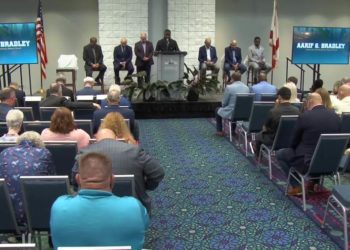The most illuminating episode of political violence last week may have taken place not in Orem, Utah, where 22-year-old Tyler Robinson has been accused of murdering the right-wing commentator and youth organizer Charlie Kirk, but on the opposite side of the planet, in Nepal.
There, the governing Communist Party tried to impose a nationwide ban on 26 major social media platforms, provoking mass youth unrest sufficient not just to reverse the ban but to topple the entire government. Dozens were killed and more than 2,000 were injured in what is being called the “Gen Z protests,” but which amounts, I think, to a proper revolution. One day after protesters raging about the obnoxious wealth of “Nepo Kids” on social media first stormed the country’s Parliament and then set it ablaze, the prime minister resigned. By the end of the week, an interim prime minister had been selected via Discord.
This is not what the politics of the internet look like in America. But neither are those politics as placid as they once seemed, when a decade ago Silicon Valley was poised to succeed the financial class as the country’s natural and somewhat apolitical elite, conceiving and building out its own vision of the future mostly unrestrained by opposing forces. Back then — to paint a simplistic picture — the internet loomed like an unstoppable teleological force. Those raising objections looked like finger-wagging moralists or Luddites fighting foolishly against the future. The country had abandoned the fantasy that the internet would be a left-libertarian utopia, but Americans still tended to think the system was run by global corporate behemoths operating somewhat beyond democratic control.
Today? “I think we are ready, or very near ready,” my colleague Ezra Klein observed in January, “for true backlash.” The TikTok ban was passed into law last year with overwhelming bipartisan support — by votes of 352 to 65 in the House and 79 to 18 in the Senate — and was affirmed in January by the Supreme Court. The social psychologist Jonathan Haidt has become a rare kind of heroic modern evangelist by campaigning against smartphones. And almost every week now, it seems, we read about a new social malady for which to blame them: neuroticism and mental illness, political polarization and global populism, fertility decline and apocalypticism, nihilism and despair and the political violence it sporadically produces.
Some of these claims are more tenuous than others, and after a week of speculation and sleuthing, it’s still not quite clear what exactly the man accused of killing Kirk might have owed, beyond perhaps the memes engraved on the bullets, to the murky depths of online nihilism or extremism. But each claim, as it comes, adds to an emergent meta-narrative about the country’s apparent crackup: The internet did it, and continues to do it. “Social media is destroying our civilization,” the liberal economics commentator Noah Smith declared last week, even before the shooting. “We need a Great Firewall” — that is, an American equivalent of the quasi-totalitarian Chinese policy of state censorship.
On Friday, while announcing Robinson’s arrest and the end of the manhunt for Kirk’s shooter, Utah’s governor, Spencer Cox, took the time to deliver an extended homily concerning the pathologies of the internet. “Social media is a cancer on our society right now,” he declared. “And I would encourage people to log off, turn off, touch grass, hug a family member, go out and do good in your community.”
Thank you for your patience while we verify access. If you are in Reader mode please exit and log into your Times account, or subscribe for all of The Times.
Thank you for your patience while we verify access.
Already a subscriber? Log in.
Want all of The Times? Subscribe.
The post A Dangerous, Bipartisan War Against the Internet Is Already Underway appeared first on New York Times.




